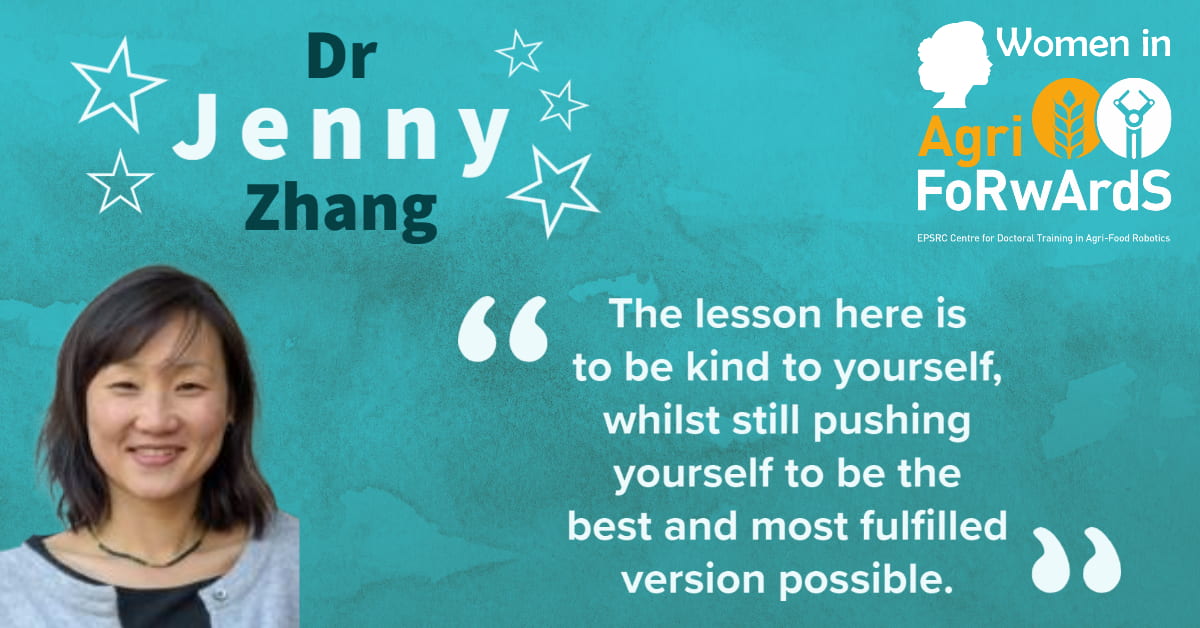For our final piece in a week of celebrating women in AgriFoRwArdS we would like to introduce two wonderful supervisors from the University of Cambridge, who are both excelling in their respective fields.

Dr Jenny Zhang is a Research Fellow with the Department of Chemistry at the University of Cambridge. Jenny completed her PhD in bioinorganic chemistry at the University of Sydney, Australia, with a brief stint at the Hebrew University of Jerusalem, where she developed redox active platinum-based anti-cancer agents and studied their bio-distribution/metabolism within tumour models. She then became a Marie Curie Incoming International Fellow at the University of Cambridge.
We asked Jenny why she decided to become involved with in a STEM subject.
I love the process of problem solving and wanted to apply myself to work on issues that would add value to the world. Research in STEM is exactly this, with enormous perks – being in the company of diverse amazing minds, the thrill of being on the frontline of discover, the pride when describing the latest project that I was working on. The only thing stopping me in the beginning was a mixture of self-doubts in my abilities and environmental/social pressure (there are more lucrative and secure jobs that didn’t require further years of training than becoming a scientist). The first issue, the self-doubts, turned out to also be a strength and made me more critical and careful with my work; the discouragements also stopped when I made the effort to place myself in the right environment. The lesson here is to be kind to yourself, whilst still pushing yourself to be the best and most fulfilled version possible.

Professor Julia Davies is Head of Group within the Department of Plant Sciences at the University of Cambridge and is a Professor of Stress Signalling.
Julia graduated from the University of Wales and studies her PhD with the University of Liverpool and the Marine Biological Association in Plymouth. She has been awarded various prizes, including a Royal Society University Research Fellowship, the SEB President’s Medal and the University of Cambridge’s Pilkington Prize in 2009
We spoke to Julia about her reasonings for choosing a STEM subject and being a successful female in the world of science.
I can remember my Dad telling me as a child that there was no job I couldn’t do because I am female, but he wouldn’t recommend coal mining. Apart from winning a prize for growing the best daffodil at infants school, there were really no indications early on that I would be a plant scientist. I enjoyed biology at secondary school but it never occurred to me that I would end up working in it, I was on track to do English, history and Latin at A level with a vague thought about doing a history degree. Then I saw what the set text would be for the next two years of English, rather the thickness of the book, and I realised that I didn’t want to go on analysing other people’s writing. I wanted to make my own discoveries that might have more practical application, so I switched to Biology, Chemistry and Physics. I was very fortunate to have fantastic female teachers so to me, science was inclusive. My physics teacher did wonder out loud once why he was teaching me about centrifugal forces because all I needed to do in life as a female was to learn how to switch on a washing machine. I have silently dedicated all my biophysics research papers to him. I was also fortunate that at the end of my botany degree, the external examiner offered me a PhD studentship after my viva. It hadn’t occurred to me at all that this could be a path I could take. Why was that? My grades were good enough, I still enjoyed science but as an introvert I didn’t engage with staff to help me with career planning and I lacked confidence. The PhD introduced me to electrophysiology, which suited me down to the ground (couldn’t resist that bad STEM joke) – mostly solitary work with opportunities to wield the spanners, screwdrivers and soldering irons
I’d enjoyed playing with as a child (thanks Dad). Electrophysiology post-doctoral contracts followed and my supervisor encouraged me to apply for a Royal Society University Research Fellowship to start my independent career. That fellowship took me to Cambridge. That’s such a hoot as I didn’t dare apply to be an undergraduate here. Teaching has been a big part of my time here and I hope I have given the encouragement to students that benefitted my career. I’ve ended up researching on how plants react to injury and how they repair themselves. Finding out is still a motivator and I hope that this can have application outside the lab. An integral and important part of this research is nurturing careers of students and staff. I hope that if you’re an introvert or member of a minority group, you will give STEM a go and find a niche in which you will thrive.
